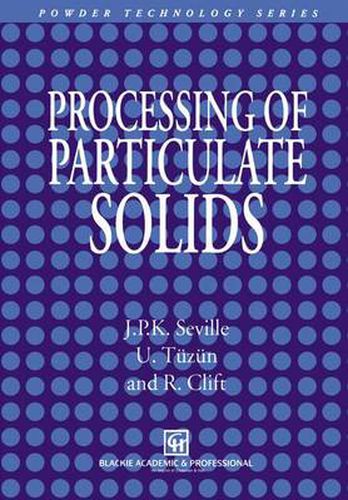Readings Newsletter
Become a Readings Member to make your shopping experience even easier.
Sign in or sign up for free!
You’re not far away from qualifying for FREE standard shipping within Australia
You’ve qualified for FREE standard shipping within Australia
The cart is loading…






This title is printed to order. This book may have been self-published. If so, we cannot guarantee the quality of the content. In the main most books will have gone through the editing process however some may not. We therefore suggest that you be aware of this before ordering this book. If in doubt check either the author or publisher’s details as we are unable to accept any returns unless they are faulty. Please contact us if you have any questions.
Over half the products of the chemical and process industries are sold in a particulate form. The range of such products is vast: from agrochemicals to pigments, from detergents to foods, from plastics to pharmaceuticals. However, surveys of the performance of processes designed to produce particulate products have consistently shown inadequate design and poor reliability. Chemical and process engineering is becoming less concerned with the design of plants to product generic simple chemical (which are often single phase fluids) and is now more concerned with speciality effect chemical which may often be in particulate form. Chemical and process engineers are also being rcruited in increasing numbers into areas outside their traditional fields: into the food industry, into pharmaceuticals, into the manufacture of a wide variety of consumer products. This book has been written to meet their needs. It provides comprehensive coverage of the technology of particulate solids, in a form which is both sufficiently accessible and sufficiently concise to be useful to engineering and science students in the final year of an undergraduate degree, and at Masters’ level.
$9.00 standard shipping within Australia
FREE standard shipping within Australia for orders over $100.00
Express & International shipping calculated at checkout
This title is printed to order. This book may have been self-published. If so, we cannot guarantee the quality of the content. In the main most books will have gone through the editing process however some may not. We therefore suggest that you be aware of this before ordering this book. If in doubt check either the author or publisher’s details as we are unable to accept any returns unless they are faulty. Please contact us if you have any questions.
Over half the products of the chemical and process industries are sold in a particulate form. The range of such products is vast: from agrochemicals to pigments, from detergents to foods, from plastics to pharmaceuticals. However, surveys of the performance of processes designed to produce particulate products have consistently shown inadequate design and poor reliability. Chemical and process engineering is becoming less concerned with the design of plants to product generic simple chemical (which are often single phase fluids) and is now more concerned with speciality effect chemical which may often be in particulate form. Chemical and process engineers are also being rcruited in increasing numbers into areas outside their traditional fields: into the food industry, into pharmaceuticals, into the manufacture of a wide variety of consumer products. This book has been written to meet their needs. It provides comprehensive coverage of the technology of particulate solids, in a form which is both sufficiently accessible and sufficiently concise to be useful to engineering and science students in the final year of an undergraduate degree, and at Masters’ level.